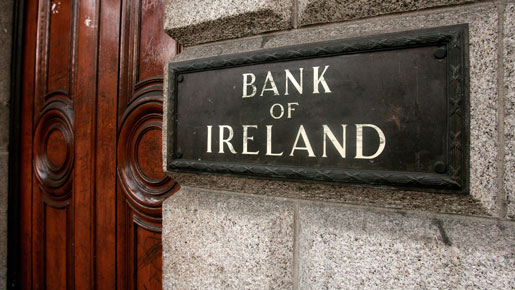
Bank of Ireland launched a plan to raise 3.4 billion euros ($4.6bn) without resorting to further state cash in a package the Irish government hopes will help differentiate it from Greece’s woes.
Ireland last year came close to a similar market attack as Greece due to its own fiscal and banking crises and Bank of Ireland’s plan will test investment appetite for Irish assets as a whole as the rescue of the fellow euro zone member kicks off.
Ireland’s biggest bank by market value plans to raise up to 1.9 billion euros in a rights issue, though that could be reduced through a debt-for-equity swap, it said.
It is hoping to raise the rest of the capital from an institutional share placing at a 15-percent discount and by converting part of the state’s preference shares into ordinary stock.
“Bank of Ireland is the first of our financial institutions to emerge from the banking crisis,” Finance Minister Brian Lenihan said in a statement after the bank’s announcement.
Lenihan pointed to the backing of institutional investors by agreeing to take up the placing, but the bank’s proposals received a more muted response from retail investors.
“It’s a few people trimming ahead of the rights issue,” one Dublin-based trader said. “It’s all smaller retailer (investors) selling it today.”
Bad bank
The financial regulator told Bank of Ireland in March to raise 2.7 billion euros to meet new minimum capital requirements and compensate for losses on discounted loans sold to the National Asset Management Agency (NAMA), Ireland’s “bad bank”.
In early April, the bank listed the four ways it planned to raise capital but it did not at that time provide any figures.
The state expects to own about 36.5 percent of Bank of Ireland after the capital raising, which will see the conversion of about one billion euros of government preference shares into ordinary stock and take part in the rights issue.
In the plan, for which Citigroup, Credit Suisse, Davy, Deutsche Bank and UBS are acting as joint bookrunners and underwriters, the state will pay for its part in the rights issue by handing over more of its preference shares.
Bank of Ireland will also pay almost 500 million euros to cancel warrants which would otherwise entitle the government to a further ordinary stake.
Before the capital raising the government held a 16-percent stake, or 34 percent including the warrants.
Bank of Ireland is in the strongest position among five banks participating in NAMA, the bad bank set up last year to cleanse balance sheets of property development loans, which between them are looking for up to 32 billion euros in capital.
Last year’s injections to keep nationalised Anglo Irish Bank afloat alone cost four billion euros, giving Ireland the highest budget deficit in the EU compared with the size of the economy, and much more state aid on its way.

